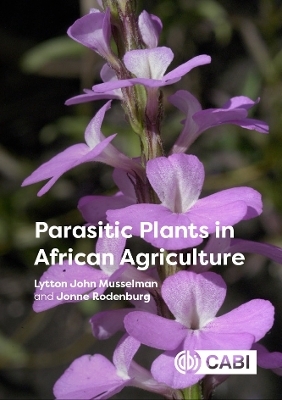
Parasitic Plants in African Agriculture
CABI Publishing (Verlag)
978-1-78924-763-3 (ISBN)
Parasitic Plants in African Agriculture brings together for the first time in a single volume, the ecology, biology, damage, and control of all groups of African parasitic plants including both the relatively few parasites introduced to the continent as well as those native parasites that have spread from within Africa. The book covers the well-known witchweeds and broomrapes but also groups and species that have received less attention including mistletoes, dodders, rice vampire weed, and other species posing threats. The book distinguishes between stem and root parasitic weeds and between holoparasites and (facultative or obligate) hemiparasites. Based on their research and experience collectively spanning six decades, the authors provide an authoritative and state-of-the-art overview of the distribution, biology and impact of these highly specialized weeds and include recommendations for their management. Since parasitic plants in African agriculture primarily affect smallholder farmers, these weeds are explicitly discussed within a context of resource limitations and global changes. Readers are informed on all parasitic plant species relevant to African agriculture and the impact these plants have on crop production and livelihoods of smallholders in a changing world. Current and future management strategies are outlined in terms of their principles and effectiveness as well as their feasibility and affordability for farmers, all of which determine farmer adoption. The final chapter synthesises some of the relevant findings and statistics regarding parasitic weed distribution and their host crops and discusses implications in terms of future crop protection concerns in African agricultural systems. Key features: · Authoritative text based on extensive field and laboratory work. · First comprehensive state-of-the-art overview of parasitic plants and their management in Africa. · Highly illustrated with photos, graphs and species distribution maps. · Reviews previous basic and applied work, with relevance to smallholder farming systems. This book will be a valuable reference for students, researchers, extension workers, development officers, national agriculture researchers, plant pathologists, food security specialists, weed scientists, agronomists and botanists.
Lytton John Musselman (Author) Lytton John Musselman is Mary Payne Hogan Professor Botany, and Manager of the Blackwater Ecologic Preserve in the Department of Biological Sciences at Old Dominion where he also served as Department Chair. His research centres on the biology of parasitic angiosperms, especially those in the Middle East and Africa. Recipient of four Fulbright Awards (Sudan, West Bank, Jordan, Brunei Darussalam), he has also been a Visiting Professor at the American University of Beirut, and the American University of Iraq-Sulaimani. He is co-founder and co-editor of Haustorium, the newsletter of the International Parasitic Plants Society, and served as a consultant to the International Institute of Tropical Agriculture and the International Center for Agricultural Research in the Dry Areas. His most recent books are Edible Wild Plants of the Carolinas: A Forager's Companion (with Peter W. Schafran) 2021, and Solomon Described Plants: A Botanical Guide to Plant Life in the Bible (2022). Jonne Rodenburg (Author) Jonne Rodenburg is Professor of Agronomy at the Natural Resources Institute of the University of Greenwich, the UK, where he teaches postgraduate students on weed and parasitic weed biology and management, agronomy and crop physiology. He researches sustainable agricultural intensification and the biology, ecology and management of parasitic weeds in annual field crop production systems in Africa. He worked and published extensively on root parasitic weeds, both obligate and facultative, as recipient of grants including from the Dutch Research Council NWO, the UKRI Biotechnology and Biological Sciences Research Council and The Royal Society. From 2004 to 2018 he worked at the Africa Rice Center as agronomist focussing on weed management in rice, with subsequent home bases in Mali, Benin, Senegal, Tanzania and Côte d'Ivoire. He is the current vice-president and president-elect of the International Parasitic Plants Society, subject editor at the European Weed Research Society journal Weed Research, published by Wiley, and associate editor at the Elsevier journal Field Crops Research.
1: Introduction to Parasitic Plants: 10.1079/9781789247657.0001
| Erscheinungsdatum | 24.10.2023 |
|---|---|
| Verlagsort | Wallingford |
| Sprache | englisch |
| Maße | 172 x 244 mm |
| Gewicht | 704 g |
| Themenwelt | Naturwissenschaften ► Biologie ► Botanik |
| Sozialwissenschaften ► Soziologie ► Spezielle Soziologien | |
| Weitere Fachgebiete ► Land- / Forstwirtschaft / Fischerei | |
| ISBN-10 | 1-78924-763-2 / 1789247632 |
| ISBN-13 | 978-1-78924-763-3 / 9781789247633 |
| Zustand | Neuware |
| Informationen gemäß Produktsicherheitsverordnung (GPSR) | |
| Haben Sie eine Frage zum Produkt? |
aus dem Bereich


